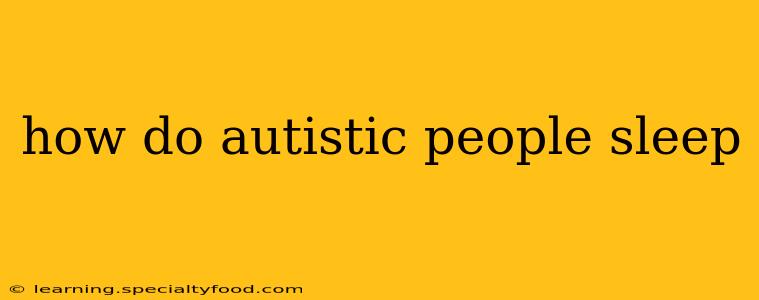How Do Autistic People Sleep? Navigating the Complexities of Sleep in Autism
Sleep disturbances are significantly more common among autistic individuals than the neurotypical population. Understanding the nuances of sleep in autism requires acknowledging the diverse spectrum of the condition and the individual differences it encompasses. While there's no single answer to "how do autistic people sleep?", we can explore common sleep challenges and potential contributing factors to provide a clearer picture.
What are the common sleep problems experienced by autistic individuals?
Many autistic individuals experience a range of sleep problems, including:
- Insomnia: Difficulty falling asleep, staying asleep, or both. This can manifest as frequent awakenings throughout the night or early morning wakings.
- Delayed Sleep Phase Syndrome (DSPS): A circadian rhythm disorder characterized by a later-than-usual sleep onset and wake time. This can make it difficult to adhere to societal sleep schedules.
- Sleep Apnea: A condition where breathing repeatedly stops and starts during sleep.
- Restless Legs Syndrome (RLS): An overwhelming urge to move the legs, often accompanied by uncomfortable sensations. This can significantly disrupt sleep.
- Night Terrors and Sleepwalking: These parasomnias are more common in autistic individuals, particularly in childhood.
What causes sleep problems in autistic people?
The reasons behind sleep difficulties in autism are complex and multifaceted. They often involve a combination of factors:
- Sensory Sensitivities: Autistic individuals often experience heightened or diminished sensitivities to sensory input (light, sound, touch, smell, taste). These sensitivities can make it challenging to create a conducive sleep environment. Bright lights, loud noises, or uncomfortable bedding can significantly disrupt sleep.
- Anxiety and Stress: Anxiety and stress are prevalent among autistic individuals and can significantly impact sleep quality. Worries about social interactions, sensory overload, or daily routines can keep them awake at night.
- Gastrointestinal Issues: Many autistic individuals experience gastrointestinal problems, such as constipation or irritable bowel syndrome (IBS). These issues can cause discomfort and pain, interfering with sleep.
- Neurological Differences: Underlying neurological differences in the brain's regulation of sleep-wake cycles may contribute to sleep disturbances.
- Medication Side Effects: Certain medications prescribed for associated conditions, such as anxiety or ADHD, can disrupt sleep patterns.
- Difficulties with Routine and Transitions: Autistic individuals often thrive on routine and predictability. Disruptions to their established routines can trigger anxiety and sleep problems.
Do autistic people need more or less sleep than neurotypical people?
There's no definitive answer to this question. While some autistic individuals may require more sleep than their neurotypical peers, others may need less. Individual sleep needs vary significantly, regardless of neurotype. The key is to identify and address any underlying sleep disturbances to ensure the individual gets adequate restorative sleep.
How can sleep problems in autistic individuals be treated?
Treatment approaches for sleep disturbances in autism are individualized and often involve a combination of strategies:
- Behavioral Interventions: Establishing consistent sleep hygiene practices, such as maintaining a regular sleep schedule, creating a calming bedtime routine, and optimizing the sleep environment. Cognitive Behavioral Therapy for Insomnia (CBT-I) can also be effective.
- Environmental Modifications: Minimizing sensory input before bed, using blackout curtains, earplugs, or weighted blankets can help create a more restful sleep environment.
- Medication: In some cases, medication may be necessary to address underlying conditions contributing to sleep problems or to directly improve sleep quality. This should always be done under the guidance of a medical professional.
- Addressing Underlying Conditions: Treating associated conditions like anxiety, gastrointestinal issues, or ADHD can significantly improve sleep.
Are there specific sleep aids recommended for autistic individuals?
There aren't specific sleep aids exclusively recommended for autistic individuals. However, certain approaches are often beneficial, such as weighted blankets (which provide deep pressure stimulation and can be calming), melatonin supplements (under medical supervision), and white noise machines (to mask distracting sounds). Always consult a healthcare professional before introducing any new sleep aids or medications.
Understanding the multifaceted nature of sleep in autism is crucial for providing effective support. By addressing underlying issues and implementing personalized strategies, individuals on the autism spectrum can improve their sleep quality and overall well-being. Remember that collaboration with healthcare professionals, including neurologists, sleep specialists, and therapists, is vital in developing an effective treatment plan.
